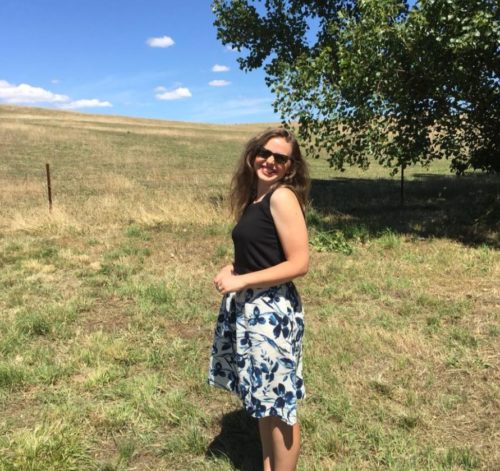
Kristen Foley, PhD candidate, CMPH (and NHMRC postgraduate scholarship awardee: Allied Health Priority Stipend)
Kristen is doing her PhD in Public Health, seeking to understand structural drivers of alcohol consumption for Australian women in mid-life.
What led you to a PhD? After my undergraduate training as an Occupational Therapist, I started working with communities and became interested in how socio-environmental structures influence health, communities and individual resilience.
To learn more about this, I enrolled in a fully online Masters of Public Health. Looking back on that always brings a big smile to my face: I completed this, including my dissertation, on an A5 laptop while travelling through South America!
Are you doing this “on the road” too? No! I’m in Port Adelaide. It’s a completely different experience to my Masters. I’m shacked up in our back office, looking out on the chickens clucking around the backyard, and remembering that I’ve forgotten to water the peace lily (again)…
When did you know that you wanted to do a PhD? I wasn’t sure I wanted to become an academic on finishing my Masters. “Doing a PhD” has never been a burning ambition of mine.
The path really began when I was offered work on a few seeding grants at the University – they involved both project management and active research work, which enabled me to experiment with being a researcher. I guess it kind of just evolved from there and I decided to complete a PhD to give myself flexibility in the future, if I do want to move seriously into academic life! I guess in that sense, it was more of a pragmatic decision than anything else: I recognised that having a PhD would provide more stable job opportunities, teach me a range of critical thinking skills, and upgrade my abilities to manage long-term projects.
I am relishing this chance to take leadership of a large and complex research project, but also having time to explore literature that I haven’t always had the chance to dive into before.
Why did you choose Flinders?I thought that the Masters of Public Health was really high quality. When I finished, a few academics at Flinders provided active employment and mentoring opportunities to expose me to what academic life is all about, and therefore whether or not I wanted to pursue a career there. I am really grateful to have worked on several projects now in different disciplines – when a great opportunity to do a PhD came up with academics I’d worked closely with, it seemed to make sense to make it happen.
Who inspires you academically? I’m inspired by academics who work across disciplines, in interdisciplinary spaces, in ways that are collaborative and bring different light to research problems that would not have been possible if the research had been completed within just one research discipline. I’m also inspired by the range of authors working to decolonise research and its methodologies.
How do you juggle and prioritise your study / research / work / home lives? With as much playfulness and creativity as possible! I love the resilience and innovation that playfulness as a way of living can bring. At the moment I am trying to play with:
- different concepts around alcohol, corporatisation and targeted marketing in my PhD
- my 4 month old
- the theoretical intersections of Occupational Therapy, Public Health, and some of the grand narratives in philosophy and sociology
- how to break up a day’s worth of zoom meetings…
How do you see your PhD preparing you for your future career? I see it as critical training in not just the technical skills of research, but a journey towards reflexive understanding of research as a practice and field. This includes understanding how universities work and what makes up an academic’s life – warts and all. I’m also putting in a lot of legwork to upskill in both quantitative and qualitative thinking and techniques!
What’s a highlight of your student life at Flinders? A few things rank highly:
- being able to walk around the lake and see the horizon from Bedford park campus
- coffee from Gaurav’s van in the Laneway
- Professor Tara Brabazon‘s vlogs that make space for HDR students to learn about how to succeed in academic life
- having access to such a talented and kind academic staff within the College of Medicine and Public Health
- the value placed on HDR students at Flinders University (evidenced by the progressive and student-centred work of the Office of Graduate Research).
Kristen’s supervisors are Professor Paul Ward, Dr Emma Miller and Dr Belinda Lunnay.

